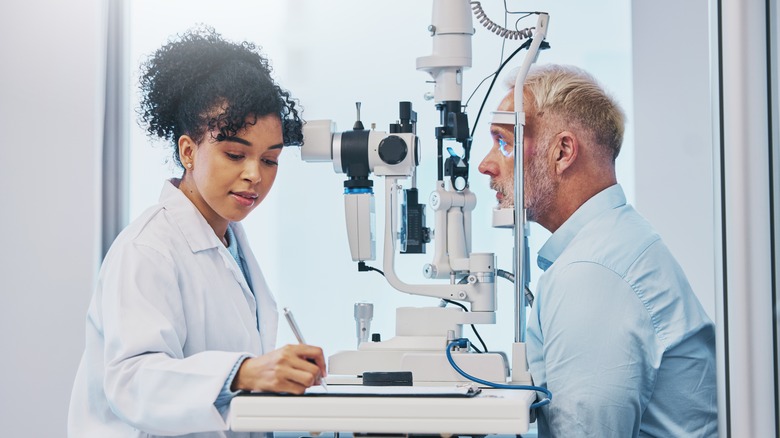Your Eyes Have An Unexpected Effect On Your Memory
Your eyes give you key information about your surroundings. They help you navigate while you're driving, they tell you when to duck when something is aiming for your head, and they take in the breathtaking colors of a sunset. When you have eye problems, such as nearsightedness, cataracts, or dry eye, it can be disruptive to your everyday life.
According to a 2023 study in JAMA Ophthalmology, vision problems are also linked to your likelihood of developing dementia. People with contrast sensitivity impairment and nearsightedness were 1.3 and 1.4 times (respectively) more likely to have dementia than those without these vision issues. Also, those with moderate to severe farsightedness or blindness were 1.72 times more likely to have dementia.
Significant eye conditions such as age-related macular degeneration, cataracts, diabetes-related eye disease, and glaucoma are also associated with an increased risk of dementia, according to a 2021 article in the British Journal of Ophthalmology. The risk for dementia was higher if people had comorbidities like diabetes and high blood pressure.
The link between vision and dementia
It's not that these studies have found that eye problems cause dementia and other conditions of cognitive decline, according to the Assil Gaur Eye Institute. Cognition and vision both tend to decline with age. However, it's possible that vision problems can accelerate this decline. When you're not getting a clear visual picture, symptoms of dementia can become more noticeable, such as the inability to recognize a familiar face. Vision loss can also cause problems reading maps and other important information, and it can also limit how much information your brain receives. When your brain isn't actively stimulated, it loses its acuity.
On the other hand, it's possible that dementia could contribute to vision loss. Lewy body dementia occurs when the brain develops clumps of protein that affect some of the brain's ability to process information, particularly visual information. People with Lewy body dementia might see large floaters or have problems seeing spatial relationships between objects. Because these vision problems have to do with the brain, your eye health might appear to be normal.
Maintaining your eye health
Although you're at a higher risk for eye diseases as you age, the National Eye Institute says that people who are overweight, have eye disease in their family history, or are African American, Hispanic, or Native American are also at an increased risk. You're also at a higher risk for eye disease if you have health conditions such as diabetes or high blood pressure.
Eating dark leafy greens and fatty fish high in omega-3s, like salmon, can protect the health of your eyes. Being physically active can help ward off diabetes and high blood pressure, which affect your eye health. Quitting smoking lowers the risk of cataracts and macular degeneration. Guard your eyes from harmful UV rays by wearing sunglasses, and take a break from your digital devices every 20 minutes to protect your eyes from excessive strain.
An annual eye exam is important for people over 60 to address any potential problems with their vision, such as removing cataracts or repairing their retina. If you wear eyeglasses, your prescription might need adjustment as you age (per Assil Gaur Eye Institute).



